Uncover the actionable insights you need—
when you need them
Our comprehensive portfolio of screening and diagnostic tests can help provide critical insights and treatment guidance across all solid tumors, precisely when needed. See below how the tests can enable personalized cancer care at key decision moments based on cancer type, starting with colorectal cancer and breast cancer.
-
Colorectal Cancer
-
Breast Cancer
-
Cancer screening
-
Personalized treatment guidance
-
Hereditary cancer testing
-
Monitoring treatment and cancer
-
Advanced cancer therapy selection
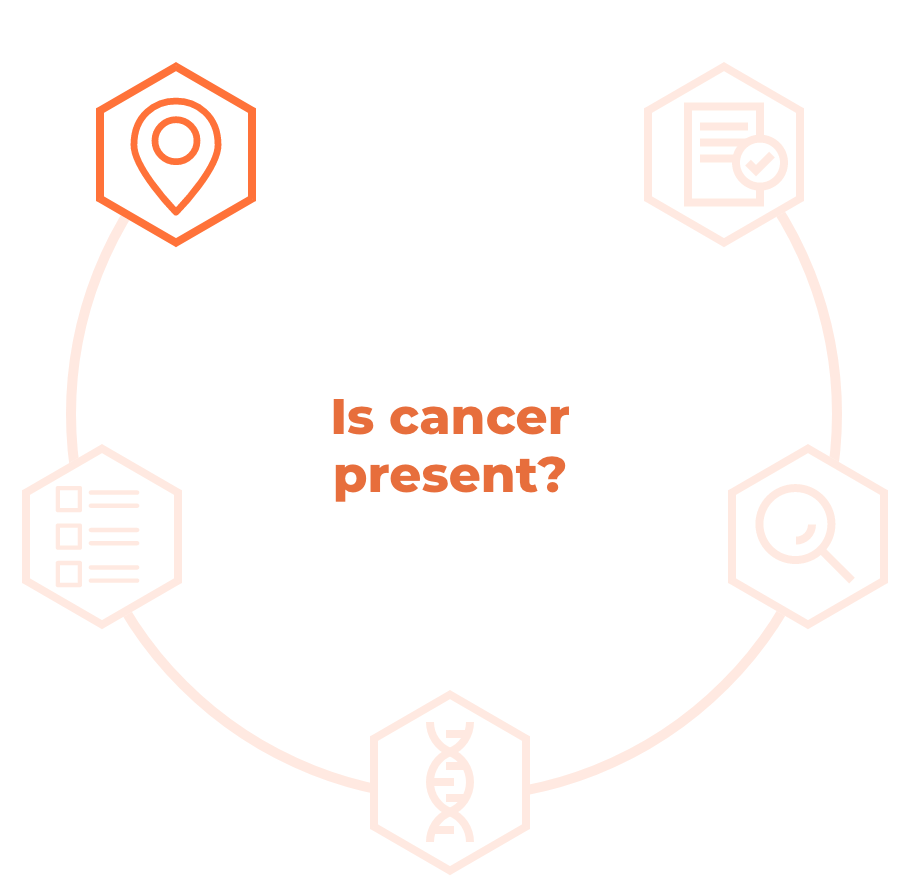
Is cancer present?
| WHAT | A convenient, noninvasive means of screening adults 45 and older at average risk for colorectal cancer that can be done at home |
| WHY | To effectively detect colorectal cancer through high sensitivity, even in early stages when it is more treatable1-3* |
| HOW | Uses proprietary stool DNA (sDNA) technology to analyze and detect 11 distinct biomarkers that are used to identify colorectal cancer and precancerous polyps1,2 |

Indications and Important Risk Information
Cologuard is intended to screen adults 45 years of age and older who are at average risk for colorectal cancer by detecting certain DNA markers and blood in the stool. Do not use if you have had adenomas, have inflammatory bowel disease and certain hereditary syndromes, or a personal or family history of colorectal cancer. Cologuard is not a replacement for colonoscopy in high risk patients. Cologuard performance in adults ages 45-49 is estimated based on a large clinical study of patients 50 and older.
The Cologuard test result should be interpreted with caution. A positive test result does not confirm the presence of cancer. Patients with a positive test result should be referred for colonoscopy. A negative test result does not confirm the absence of cancer. Patients with a negative test result should discuss with their doctor when they need to be tested again. False positives and false negative results can occur. In a clinical study, 13% of people without cancer received a positive result (false positive) and 8% of people with cancer received a negative result (false negative). Rx only.
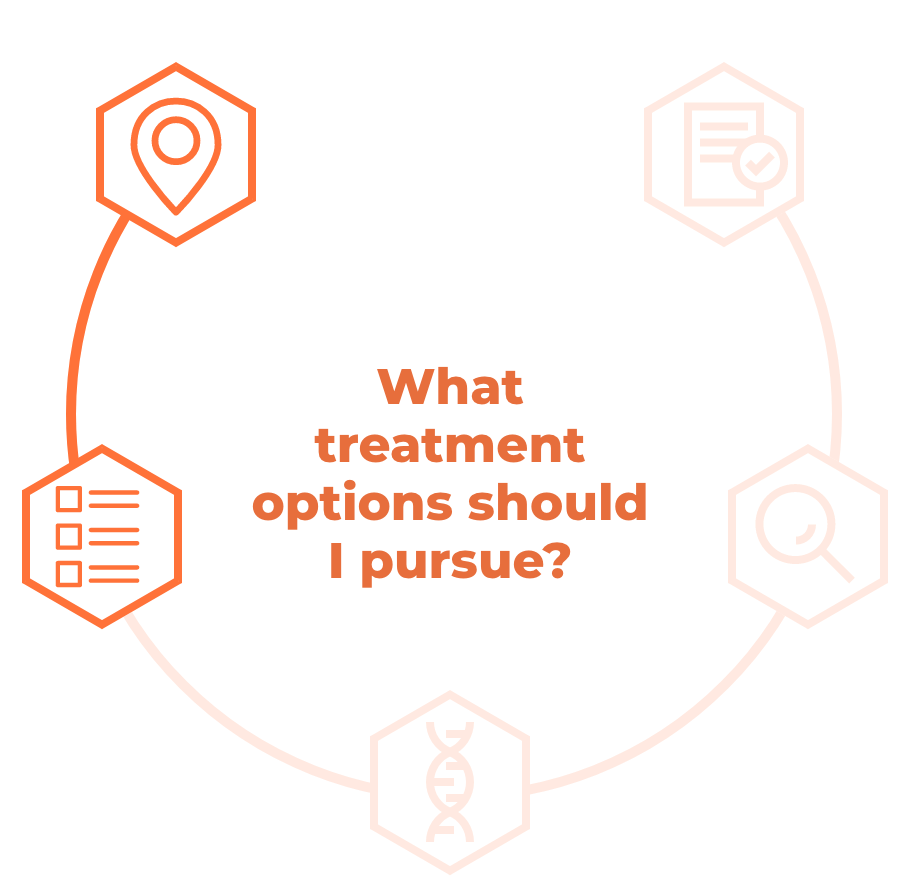
What treatment options should I pursue?
| WHAT | A 12-gene genomic test, including 7 cancer-related genes and 5 reference genes4 |
| WHY | To quantify an individual’s risk of recurrence with colorectal cancer and to help determine how an individual’s condition is best managed after surgery4-6 |
| HOW | Through molecular testing of a tumor biopsy sample, individuals and their doctors can leverage the tumor’s underlying biology to guide treatment decisions that fit their unique situation |

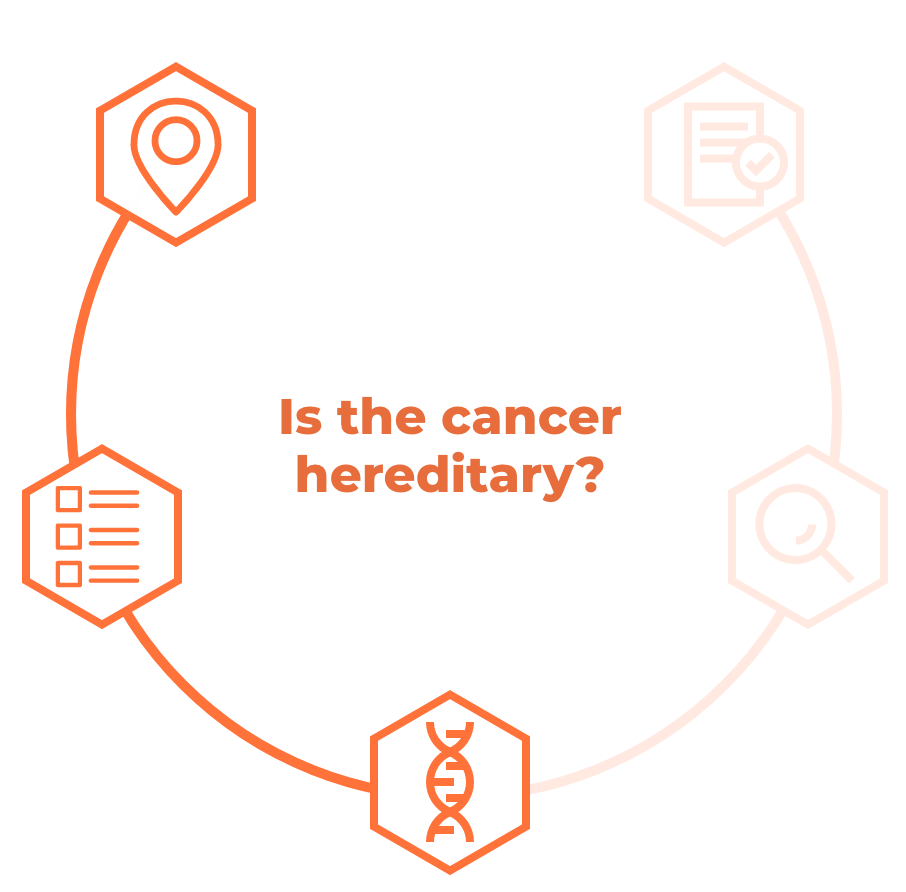
Is the cancer hereditary?
| WHAT | A risk assessment tool that can uncover hereditary cancer risk, supporting personalized care |
| WHY | The Riskguard test can assist with informing an individualized plan including targeted therapy, surgical treatment planning, and increased surveillance for second primary cancers. For those without cancer, it can provide risk stratification, which can help inform potential risk-reducing and screening strategies7 |
| HOW | By utilizing a multi-cancer, multigene panel designed to identify germline variants in blood, saliva, and buccal swab samples |
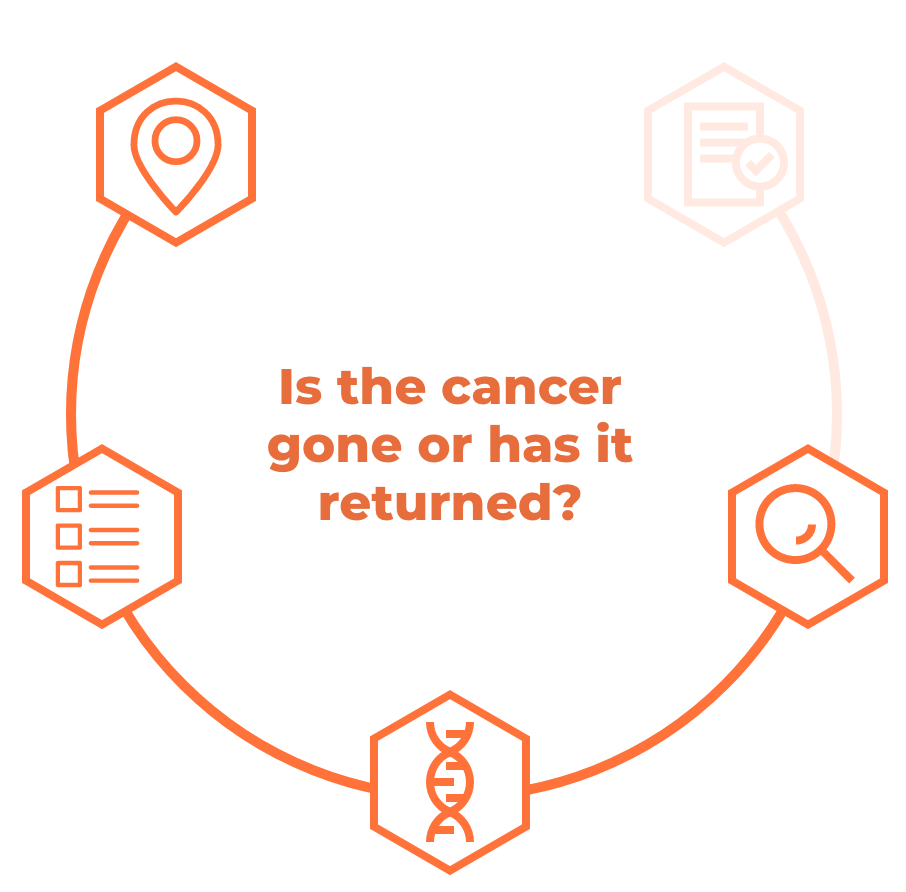
Is the cancer gone or has it returned?
| WHAT | Exact Sciences is developing the Oncodetect™ test, a tumor-informed molecular residual disease (MRD) test for patients diagnosed with solid tumor cancers |
| WHY | The Oncodetect test is designed to be used in many ways:
|
| HOW | By identifying somatic alterations in DNA extracted from the tumor tissue and detecting a subset of these mutations in circulating tumor DNA (ctDNA) that may be present in an individual’s blood |
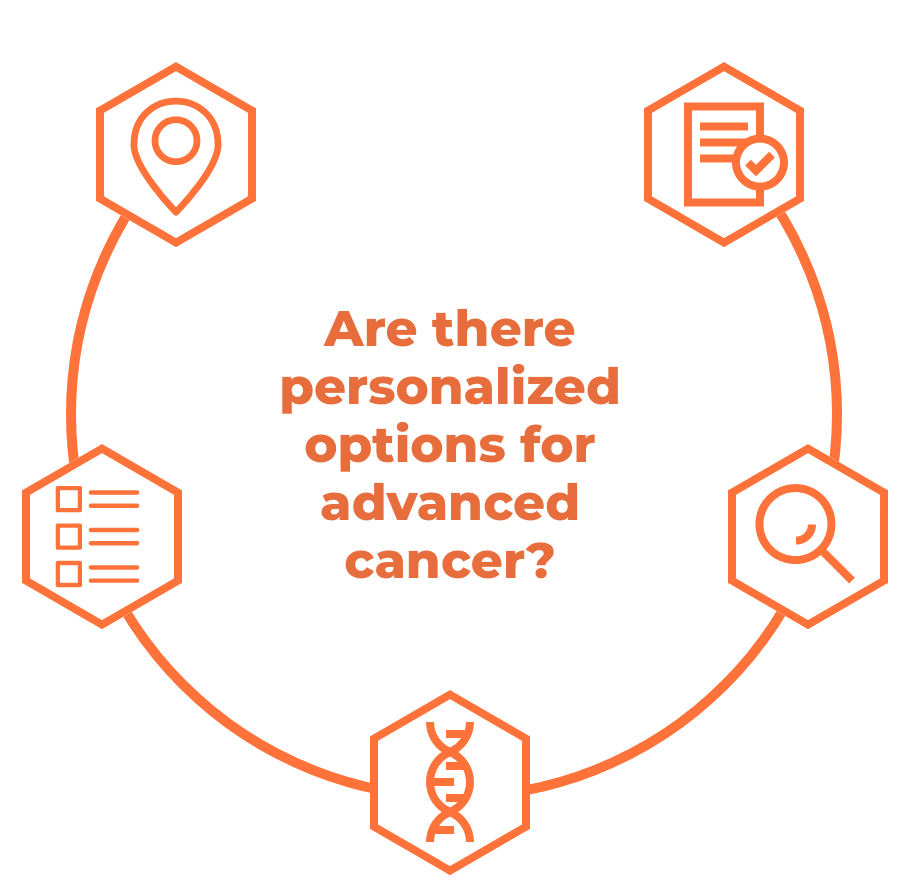
Are there personalized options for advanced cancer?
| WHAT | An ultra-comprehensive, ultra-personalized genomic profiling test that looks at DNA+RNA in nearly 20,000 genes8 |
| WHY | To identify the biomarkers associated with targeted therapy, immunotherapy, and clinical trials |
| HOW | Uncovers clinically actionable mutations and fusions through whole-exome, whole-transcriptome, patient-matched tumor-normal sequencing8 |
| WHAT | Exact Sciences is developing the Oncoliquid™ test, a liquid biopsy test offering a complementary option to tissue-based testing with the OncoExTra test |
| WHY | To identify the most appropriate therapy or clinical trial options for patients with solid tumors, utilizing a simple blood draw |
| HOW | Identifies clinically actionable mutations through detecting and interrogating fragments of circulating tumor DNA (ctDNA) found in the patient’s bloodstream |
-
Personalized treatment guidance
-
Radiation benefit guidance
-
Hereditary cancer testing
-
Monitoring treatment and cancer
-
Advanced cancer therapy selection
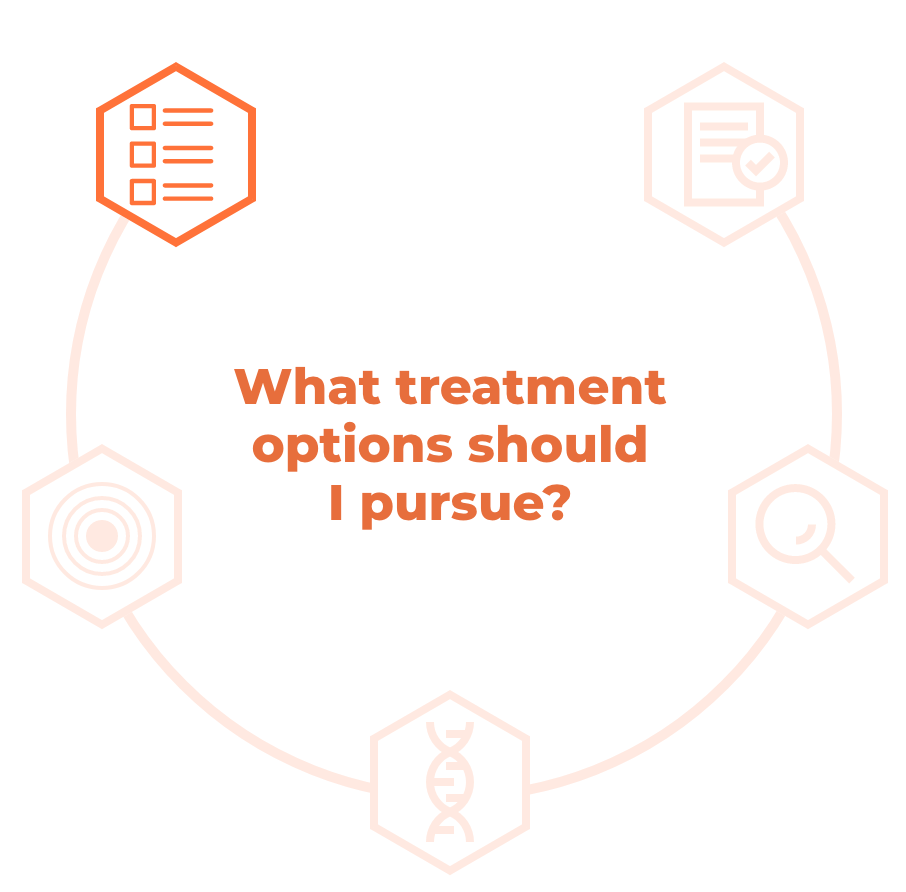
What treatments options should I pursue?
| WHAT | A 21-gene genomic test, including 16 cancer-related genes and 5 reference genes9 |
| WHY | To help determine whether an individual diagnosed with early-stage breast cancer may benefit from chemotherapy and to quantify their individual risk of recurrence9-12 |
| HOW | Analysis of a tumor’s unique biology through molecular testing helps individuals and their doctors make personalized chemotherapy treatment decisions in early-stage HR+, HER2- breast cancer |

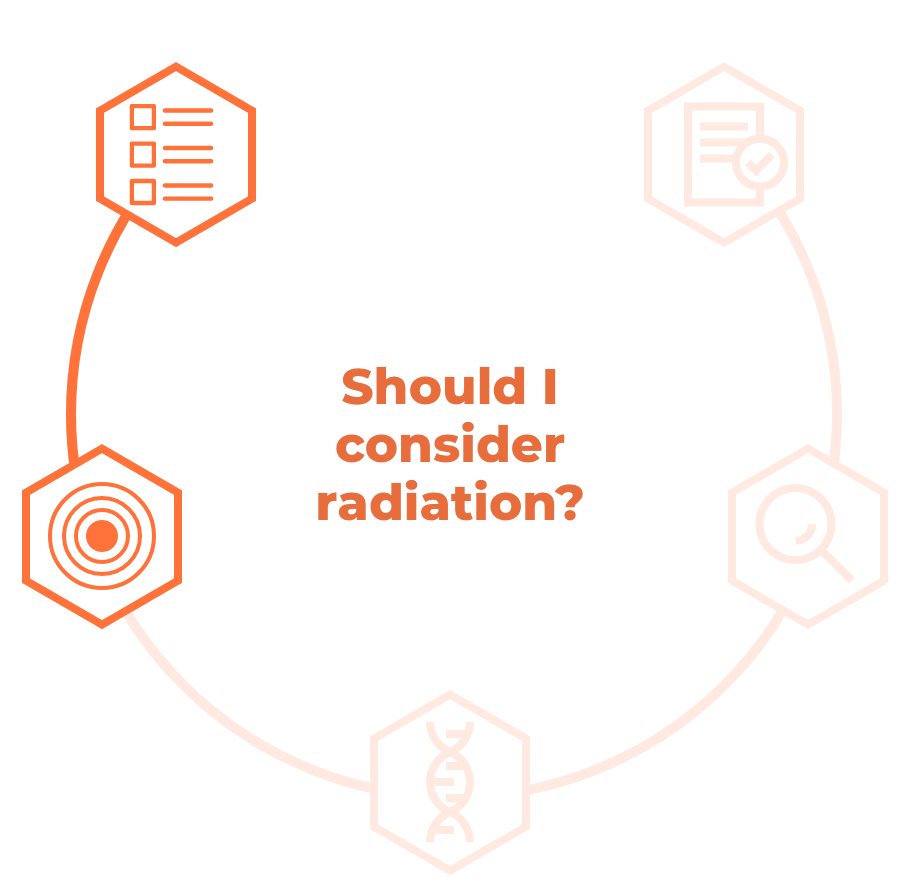
Should I consider radiation?
| WHAT | A 12-gene genomic test that provides an individualized assessment to help determine the risk of local recurrence for those diagnosed with ductal carcinoma in situ (DCIS)13-15 |
| WHY | To help inform an individual’s radiation therapy decision by providing information that goes beyond traditional clinical and pathological factors13-15 |
| HOW | Analysis of a tumor’s unique biology through molecular testing helps individuals and their doctors make personalized radiotherapy treatment decisions |

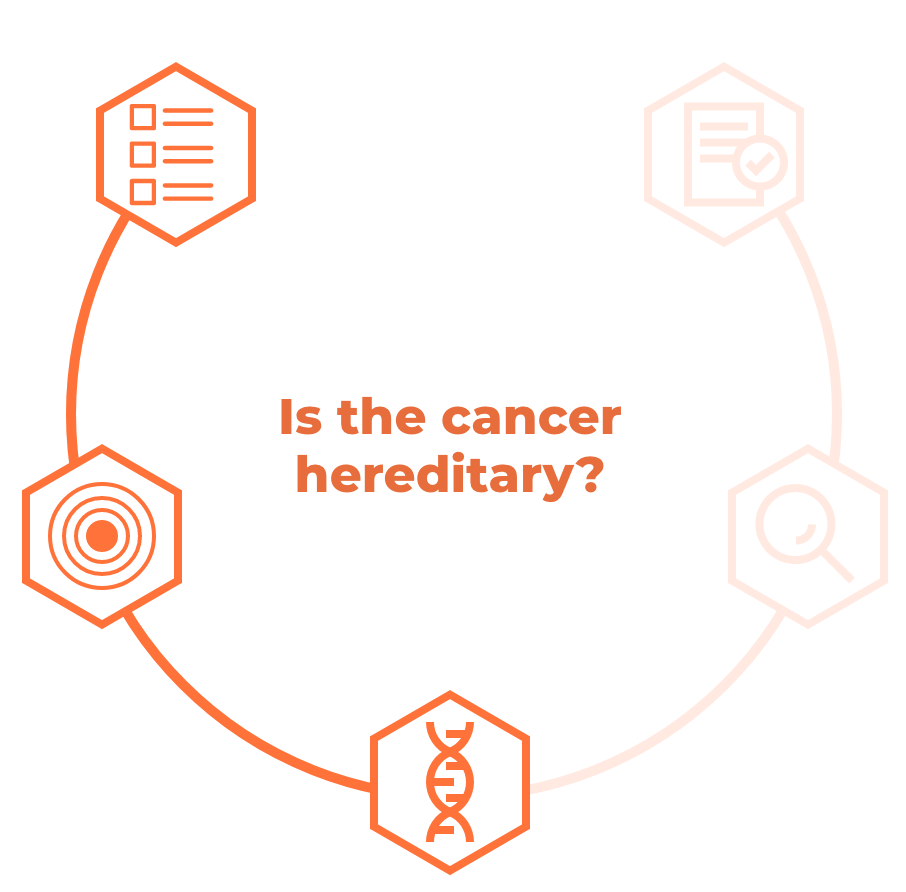
Is the cancer hereditary?
| WHAT | A risk assessment tool that can uncover hereditary cancer risk, supporting personalized care |
| WHY | The Riskguard test can assist with informing an individualized plan including targeted therapy, surgical treatment planning, and increased surveillance for second primary cancers. For those without cancer, it can provide risk stratification, which can help inform potential risk-reducing and screening strategies16,17 |
| HOW | By utilizing a multi-cancer, multigene panel designed to identify germline variants in blood, saliva, and buccal swab samples |
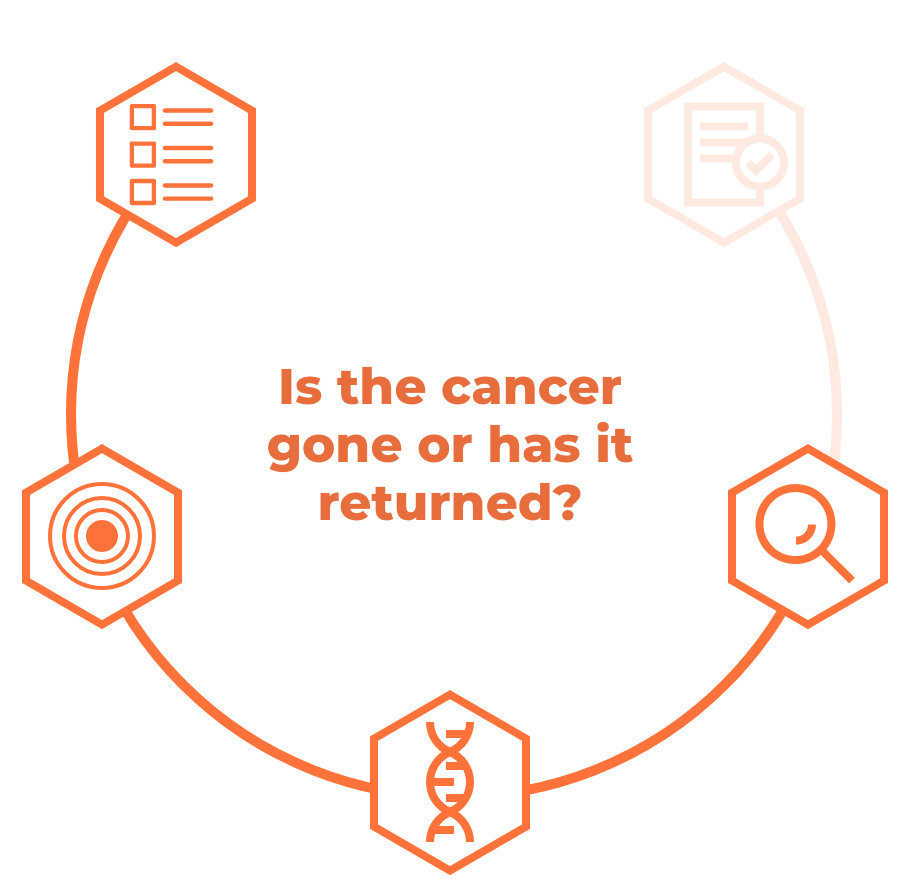
Is the cancer gone or has it returned?
| WHAT | Exact Sciences is developing the Oncodetect™ test, a tumor-informed molecular residual disease (MRD) test for patients diagnosed with solid tumor cancers |
| WHY | The Oncodetect test is designed to be used in many ways:
|
| HOW | By identifying somatic alterations in DNA extracted from the tumor tissue and detecting a subset of these mutations in circulating tumor DNA (ctDNA) that may be present in an individual’s blood |

Are there personalized options for advanced cancer?
| WHAT | An ultra-comprehensive, ultra-personalized genomic profiling test that looks at DNA+RNA in nearly 20,000 genes8 |
| WHY | To identify the biomarkers associated with targeted therapy, immunotherapy, and clinical trials |
| HOW | Uncovers clinically actionable mutations and fusions through whole-exome, whole-transcriptome, patient-matched tumor-normal sequencing8 |
| WHAT | Exact Sciences is developing the Oncoliquid™ test, a liquid biopsy test offering a complementary option to tissue-based testing with the OncoExTra test |
| WHY | To identify the most appropriate therapy or clinical trial options for patients with solid tumors, utilizing a simple blood draw |
| HOW | Identifies clinically actionable mutations through detecting and interrogating fragments of circulating tumor DNA (ctDNA) found in the patient’s bloodstream |
-
References
- Cologuard® Clinician Brochure. Madison, WI: Exact Sciences Corporation.
- Imperiale TF, Ransohoff DF, Itzkowitz SH, et al. Multitarget stool DNA testing for colorectal-cancer screening. N Engl J Med. 2014;370(14):1287-1297.
- American Cancer Society. Survival rates for colorectal cancer. Accessed February 15, 2024. https://www.cancer.org/cancer/ colon-rectal-cancer/detection-diagnosisstaging/ survival-rates.html
- Venook AP, Niedzwiecki D, Lopatin M, et al. Biologic determinants of tumor recurrence in stage II colon cancer: validation study of the 12-gene recurrence score in cancer and leukemia group B (CALGB) 9581. J Clin Oncol. 2013;31(14):1775-1781.
- Yothers G, O’Connell MJ, Lee M, et al. Validation of the 12-gene colon cancer recurrence score in NSABP C-07 as a predictor of recurrence in patients with stage II and III colon cancer treated with fluorouracil and leucovorin (FU/LV) and FU/LV plus oxaliplatin. J Clin Oncol. 2013;31(36):4512-4519.
- Yamanaka T, Oki E, Yamazaki K, et al. 12- gene recurrence score assay stratifies the recurrence risk in stage II/III colon cancer with surgery alone: the SUNRISE study. J Clin Oncol. 2016;34(24):2906-2913.
- Ladabaum U, Wang G, Terdiman J, et al. Strategies to identify the Lynch syndrome among patients with colorectal cancer: a cost-effectiveness analysis. Ann Intern Med. 2011;155(2):69-79.
- White T, Szelinger S, LoBello J, et al. Analytic validation and clinical utilization of the comprehensive genomic profiling test, GEM ExTra®. Oncotarget. 2021;12(8):726-739.
- Paik S, Shak S, Tang G, et al. A multigene assay to predict recurrence of tamoxifentreated, node-negative breast cancer. N Engl J Med. 2004;351(27):2817-2826.
- Paik S, Tang G, Shak S, et al. Gene expression and benefit of chemotherapy in women with node-negative, estrogen receptor-positive breast cancer. J Clin Oncol. 2006;24(23):3726-3734.
- Dowsett M, Cuzick J, Wale C, et al. Prediction of risk of distant recurrence using the 21-gene recurrence score in node-negative and node-positive postmenopausal patients with breast cancer treated with anastrozole or tamoxifen: a TransATAC study. J Clin Oncol. 2010;28(11):1829-1834.
- Albain KS, Barlow WE, Shak S, et al. Prognostic and predictive value of the 21- gene recurrence score assay in postmenopausal women with nodepositive, oestrogen-receptor-positive breast cancer on chemotherapy: a retrospective analysis of a randomised trial. Lancet Oncol. 2010;11(1):55-65.
- Solin LJ, Gray R, Baehner FL, et al. A multigene expression assay to predict local recurrence risk for ductal carcinoma in situ of the breast. J Natl Cancer Inst. 2013;105(10):701-710.
- Rakovitch E, Nofech-Mozes S, Hanna W, et al. A population-based validation study of the DCIS Score predicting recurrence risk in individuals treated by breast-conserving surgery alone. Breast Cancer Res Treat. 2015;152(2):389-398.
- Rakovitch E, Nofech-Mozes S, Hanna W, et al. Multigene expression assay and benefit of radiotherapy after breast conservation in ductal carcinoma in situ. J Natl Cancer Inst. 2017;109(4):djw256.
- Geyer CE Jr, Garber JE, Gelber RD, et al; OlympiA Clinical Trial Steering Committee and Investigators. Overall survival in the OlympiA phase III trial of adjuvant olaparib in patients with germline pathogenic variants in BRCA1/2 and high-risk, early breast cancer. Ann Oncol. 2022;33(12):1250-1268.
- Domchek SM, Friebel TM, Singer CF, et al. Association of risk-reducing surgery in BRCA1 or BRCA2 mutation carriers with cancer risk and mortality. JAMA. 2010;304(9):967-975.



